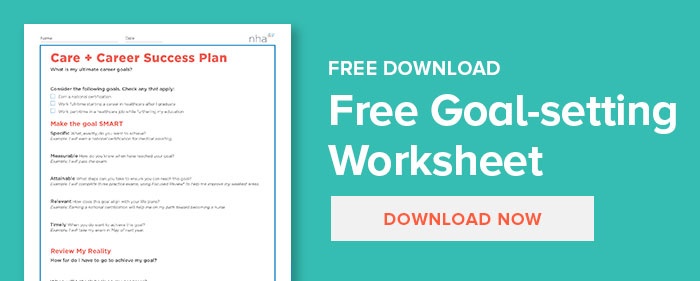Allied health instructors play such an imperative role in career success: not only are you tasked with giving students prescribed knowledge and skills to take on important healthcare roles, but you're also helping students develop life skills that will help them succeed in all areas of their life — career and personal.
One skill that should be taught in healthcare education programs is goal-setting. Learning to create goals throughout education and training programs can translate to greater achievements in virtually any environment. By setting milestones, students can remain focused and develop technical and clinical skills as well as essential soft skills that will serve them throughout their career and lives.
Do you encourage your students to set goals? Here are five reasons why it's a powerful skill to incorporate in your program.
1. It fuels ambition
Setting goals helps students focus their energy in positive directions. When presented with challenges, having a concrete goal in mind can give them the determination they need to overcome and triumph. Achieving these milestones helps build confidence to keep going and growing.
2. It prepares them for the workforce
Goal setting is often part of an annual review process. Teaching students about goal-setting early can get them acquainted with the process and give them practice that will translate into smarter goals as they enter the workforce. It will also help them learn to pace themselves and their work in ways that are realistic to find some work/life balance.
3. It prepares them for handling pressure
When students have a specific goal and a deadline, a sense of accountability is established. There's pressure to succeed, and skills such as critical thinking and time management — which are vital when handling pressure in the healthcare field — are exercised. Encourage your students to check-in often with you, and with themselves. Communication and prioritization are also valuable lessons when meeting a goal is at risk.
4. It helps them improve weaknesses
Setting goals involves looking at successes and failures to identify areas for improvement. This encourages students to face and overcome their weaknesses. Ultimately, this helps them improve their skills to take on important responsibilities in their future jobs. It can also be a lesson in humility, very rarely are we good at everything and sometimes we have to accept that too.
5. It builds confidence
When students overcome obstacles and meet their goals, it builds confidence and can improve their self-image. As a student who is likely about to embark on a new career journey, a little confidence can go a long way.
There are so many great opportunities to encourage students to set goals: during orientation, at the start of a class, in preparation for a big exam, after a big exam, in preparation for graduation and certification, and more. Before you dive into your next lesson plan, consider taking a pause to teach some valuable life skills that will serve those in your classroom and their future healthcare careers.




